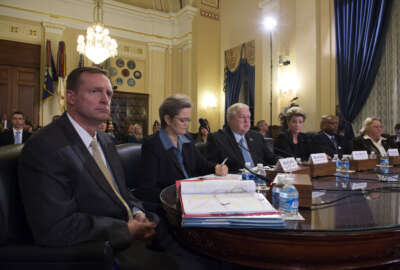
VA board of senior health execs would review disciplinary appeals
Negotiations between the House and Senate VA committees over a new veterans omnibus have stalled, as the Veterans Affairs Department releases more details in its...
The Veterans Affairs Department’s vision to change accountability procedures for its senior executive core is coming into sharper focus now, while negotiations between the House and Senate VA committees over a veterans omnibus package have stalled.
A draft bill from VA Secretary Bob McDonald, which he submitted to House Speaker Paul Ryan (R-Wis.) and Vice President Joe Biden March 23, formally describes proposals he and other department leaders have mentioned over the past few months. “The Department of Veterans Affairs Accountability Enhancement Act” amends the current disciplinary appeals process for the department’s senior executives and reclassifies senior health care professionals at the VA under Title 38.
“The Office of Management and Budget advises that there is no objection to the submission of this legislative proposal to the Congress and that its enactment would be in accordance with the program of the President,” McDonald wrote.
McDonald’s formal proposal comes as the House and Senate draft their own versions of a veterans omnibus package, which will likely include provisions that would change how veterans can access health care in the community, as well as an overhaul to the VA’s claims process.
But it’s the question of accountability that’s holding back negotiations between both committees.
According to the VA’s draft, the secretary will have the authority to appoint, pay, appraise and discipline medical center directors, Veterans Integrated Service Network directors and other senior health care executives under Title 38 of the U.S. Code.
Those executives cannot appeal disciplinary actions through the Merit Systems Protection Board. Instead, the secretary will appoint three career senior VA health executives to sit on an Internal Executive Appeals Board, which will review disciplinary appeals from Title 38 employees, the proposal said.
“The Internal Executive Appeals Board will, within 45 days of the appeal, deliver a written decision as to whether the secretary should sustain the action or reverse the action based on harmful procedural error or lack of substantial evidence,” the draft bill said.
The VA secretary, however, would have the final authority to accept the board’s decision, ask the board to review it again or offer a less severe punishment. The employee can ask for outside legal counsel to review the VA’s final decision.
The bulk of VA’s new accountability provisions apply only to senior medical professionals, but the draft bill does amend parts of the appeals process for Title 5 senior executives.
According to the VA’s draft, the MSPB itself would review a senior executive’s appeal rather than an administrative judge at the agency, the proposal suggests. The Board would have 30 days to issue a decision rather than the 21-day timeline judges currently have under the VA Access, Choice and Accountability Act.
The proposal also clarifies a concern the VA has recently voiced in the wake of three disciplinary decisions the MSPB overturned in February. VA leadership has said MSPB judges deferred to their own judgment of the VA’s punishments rather than the evidence submitted under the appeal.
The VA’s proposal specifically defines “substantial evidence” as “relevant evidence that a reasonable person, considering the records as a whole, might accept as adequate to support a conclusion, even though other reasonable persons might disagree.”
Stalled negotiations?
But the issue of accountability is a major point of contention for both House and Senate VA committees, as both disagree over what new accountability procedures for the department’s SES should look like in the forthcoming veterans omnibus.
A House staff member described the VA’s proposal as “inadequate” because the provisions wouldn’t apply to all employees at the department — only senior executives.
The House VA Committee is working on its own omnibus, which will include provisions from 21 different veterans bills that have already cleared the House, the staff member said.
One of those bills is the VA Accountability Act of 2015, which Miller introduced last summer. The legislation, which shortens the firing process for all employees at the department, cleared the House and was referred to the Senate VA Committee last July.
The Senate committee is “ironing out last minute details and hope[s] to introduce legislation in the next week or two,” a spokesperson for Senate VA Committee Chairman Johnny Isakson (R-Ga.) wrote in an email to Federal News Radio.
But the House staff member said the Senate has cut the House VA committee out of the negotiations process.
And a letter from House VA Committee Chairman Jeff Miller (R-Fla.) and Sen. Marco Rubio (R-Fla.) to Isakson suggests a similar situation.
“We are now concerned that you have halted the aforementioned negotiations and may be taking an approach that favors reaching a deal with the administration or others at any cost, regardless of whether it actually addresses the VA’s many problems or pays for new programs in a responsible way,” Miller and Rubio wrote March 31.
Accountability is the most “pressing” problem the omnibus needs to address, the Senate committee spokesperson said. Isakson described the accountability piece as the “linchpin” of the forthcoming legislation, which he hopes to have ready for President Barack Obama’s signature by Memorial Day, he said during a March 15 hearing.
Copyright © 2025 Federal News Network. All rights reserved. This website is not intended for users located within the European Economic Area.
Nicole Ogrysko is a reporter for Federal News Network focusing on the federal workforce and federal pay and benefits.
Follow @nogryskoWFED





